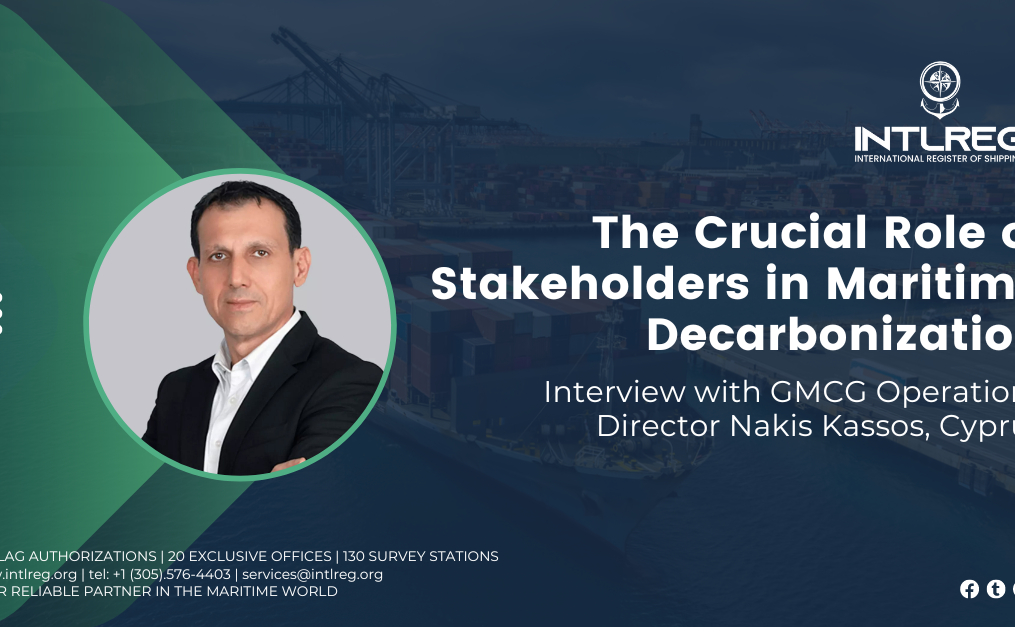The Crucial Role of Stakeholders in Maritime Decarbonization. Interview with GMCG Operations Director Nakis Kassos, Cyprus
The maritime industry, responsible for transporting over 80% of the world’s goods, is under increasing pressure to reduce its environmental footprint. As the world strives to combat climate change, the maritime sector is at a crossroads, with decarbonization as its North Star. While regulations and technological advancements play a significant role in this transformation, every stakeholder that is involved in the process is the linchpin in this journey towards sustainability.
INTLREG and the Global Maritime Consultants Group (GMCG) have ventured into an exclusive partnership that signifies a significant step forward in enhancing safety within the maritime industry. Both organizations, renowned for their commitment to maritime excellence, have joined forces to promote safety, environmental stewardship, and innovation on a global scale.
Under this partnership, INTLREG and GMCG will pool their extensive expertise and resources to develop and implement cutting-edge safety initiatives, training programs, and consultancy services. This collaboration aims to empower maritime stakeholders, including shipowners, operators, and crews, with the knowledge and tools needed to navigate the seas with the highest standards of safety.
We had the opportunity to speak with GMCG Operations Director Nakis Kassos to get his views on the promotion of safety via this strategic partnership.
Q: Mr. Kassos, what are your thoughts with regards to the weight of responsibility being carried by this partnership?
Kassos: The strategic alliance between INTLREG and GMCG bears a considerable duty in advancing safety, environmental control, and innovative practices within the maritime sector. As the maritime sector faces growing pressure to reduce its environmental impact, this collaboration demonstrates our commitment to addressing these challenges. Both organizations bring extensive expertise and resources to the table, working together to provide industry stakeholders with the knowledge and tools needed to maintain the highest safety standards. This responsibility is significant due to the industry’s essential role in global trade and its impact on the environment.
Q: Speaking of adherence to regulations, how do GMCG and INTLREG help their clients in decisionmaking related to this subject?
Kassos: GMCG and INTLREG play a vital role in guiding their clients through the complex world of maritime regulations. They offer consulting services and expertise to support shipowners, operators, and crews in making knowledgeable choices regarding regulatory compliance. This requires staying current with changing regulations, ensuring vessels meet safety criteria, and addressing environmental directives. Drawing upon their extensive knowledge in vessel classification, compliance verification, safety evaluation, and consulting, GMCG and INTLREG provide counsel that empowers clients to fulfil regulatory requirements while preserving operational efficiency.
Q: What can you say about current trends for fuel and energy choices? What is the impact on the operational efficiency of the vessels?
Kassos: The main developments in fuel and energy preferences within the maritime sector center on reducing carbon emissions and improving environmental sustainability. These changes are driven by regulatory directives and the worldwide movement towards more eco-friendly energy sources. Shipowners are actively considering alternative fuels such as LNG, biofuels, hydrogen, and electric propulsion systems to diminish greenhouse gas emissions. Although these choices may necessitate initial investments, they have the potential to boost vessel efficiency over the long term by reducing fuel consumption and emissions. The adoption of cleaner energy options aligns with the industry’s decarbonization goals.
Q: Speaking of the overall maritime industry, does GMCG actively engage in knowledge sharing and best practice dissemination?
Kassos: Certainly, GMCG is deeply involved in encouraging knowledge sharing and the distribution of best practices within the maritime field. Their dedication to maritime excellence goes beyond consultancy services. GMCG conducts training programs and initiatives aimed at spreading best practices, introducing a safety culture, and advancing management system development. Sharing knowledge and supporting industry-wide best practices are critical steps in improving safety, sustainability, and efficiency in maritime operations.
Conclusion
INTLREG, as a leading classification society, brings its decades of experience in vessel classification, compliance verification, and safety assessment to the table. GMCG, with its deep consulting and training capabilities, complements INTLREG’s strengths by offering a holistic approach to safety culture and management system development.
Together, they intend to facilitate the adoption of best practices, latest technologies, and sustainable solutions within the maritime industry. This partnership represents a shared commitment to ensuring that safety remains at the forefront of maritime operations, protecting lives, the environment, and the future of the industry. As the maritime sector evolves, INTLREG and GMCG stand shoulder to shoulder, ready to champion safety as an unwavering priority on the global maritime agenda.

